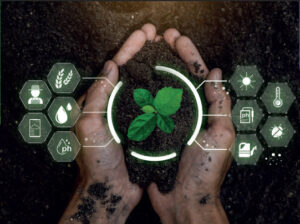Transforming Agriculture Through AI: A Path to Sustainable Development in Africa

In our rapidly evolving world, the blending of technology with traditional sectors is reshaping a new reality that was once unimaginable. Amid these remarkable advancements, an incredible synergy has emerged between artificial intelligence (AI) and agriculture. Contrary to initial concerns, AI has proven to be a beacon of hope — a transformative force that not only encourages sustainable farming practises and empowers small-scale farmers, but also confronts the pressing challenges posed by climate change.
AI-powered innovations are on the cusp of ushering a new era of sustainable agriculture. By tapping into vast data sets and predictive analytics, AI provides invaluable insights that enhance crop management, resource allocation, and yield optimisation. The integration of AI technology with smart sensors and drones offers real-time data on soil conditions, crop health, and water usage. This allows farmers to make well-informed decisions that minimise waste and maximise productivity. In essence, AI paves the way for precision agriculture, minimising environmental impact while boosting efficiency – a crucial step towards achieving long-term sustainability.

In Africa, agriculture primarily relies on smallholder farmers, underscoring the importance of their empowerment for food security and economic growth. AI can play a pivotal role in providing tools to overcome challenges such as limited access to information and resources. For instance, AI-powered mobile applications offer weather forecasts, advice on pest control, and real-time market price updates. These resources enable farmers to make informed decisions that directly impact their livelihoods. Furthermore, AI’s predictive capabilities, fuelled by machine learning algorithms, help anticipate and prevent crop disease, safeguarding yields and contributing to national food security.
Climate change’s impact on agriculture cannot be underestimated. Shifting weather patterns, prolonged droughts, and extreme temperatures pose significant threats to crop yields and overall food security. Here, AI can act as a shield of resilience by simulating climate scenarios, forecasting weather patterns, and providing guidance on adaptive measures. By employing AI-powered satellite imagery, it’s possible to monitor soil moisture levels, leading to efficient water management through precise irrigation. The incorporation of AI enhances agricultural resilience, helping mitigate the detrimental effects of climate change.
While the potential of AI is immense, its transformational impact depends on supportive policies and strategic government interventions. Policymakers hold the key to fostering an environment conducive to AI research and development. Collaboration between governments and tech companies can result in AI-powered solutions tailored to local challenges. Moreover, public-private partnerships facilitate the integration of AI tools by offering training, technology access, and market connections to smallholder farmers.
With its rich agricultural heritage and burgeoning technology ecosystem, Africa stands at a unique crossroads to harness AI’s potential for sustainable agriculture. Governments can champion this movement by promoting digital literacy and creating regulatory frameworks that incentivise innovation. Investments in AI education and research will empower a new generation of agri-tech entrepreneurs, ensuring localised solutions for local challenges. AI-driven agriculture aligns with Africa’s vision of self-reliance and sustainable growth.
The convergence of AI and sustainable agriculture presents an extraordinary opportunity for Africa. By enhancing productivity, empowering smallholder farmers, and confronting climate challenges, AI holds the potential to revolutionise the agricultural landscape. However, this transformation demands collective efforts. Governments, policymakers, tech companies, and farmers must unite to harness AI’s capabilities and pave the way for a future where sustainable agriculture guarantees food security, economic growth, and environmental preservation.
Picture a world where crops thrive, resources are optimised, and farmers prosper – all thanks to the contribution of artificial intelligence in agriculture. It’s time to recognise the transformative potential of AI in agriculture. The agriculture of tomorrow is here, and it’s fuelled by technology. By working together, we can harness the power of AI to create a more sustainable and prosperous future for agriculture. Governments can support the development and adoption of AI by investing in research and development, creating favourable regulatory frameworks, and providing training and support for farmers. Businesses can develop and deploy AI-powered solutions that address the challenges facing agriculture. Individuals can also support the development of AI in agriculture by raising awareness about the issue and advocating for policies that promote its adoption.

